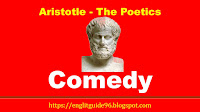Aristotle
- The Poetics
Epic
The epic is earlier in origin than either
tragedy or comedy. It grew out of the old hymns to the gods and songs sung in
praise of famous men. In its nature it resembles tragedy closely but in its
form it is different. Taking its nature first, it is also an imitation of a
serious action, ‘whole and complete, with a beginning, a middle and an end.
‘Whoever, therefore’, says Aristotle, ‘knows what is good or bad tragedy, knows
also about epic poetry’. The structure of its plot follows the same pattern. It
has a complication, a turning point and a denouement and it is either complex
or simple that is with or without peripeteia and anagnorisis. It has the same
unity of action and produces the same kind of pleasure, viz that arising from
catharsis, since the epic also has tragic happenings. Its characters are also
of the same: plot, character, thought and diction, the remaining two, song and
spectacle, belonging to tragedy only.






















0 Comments